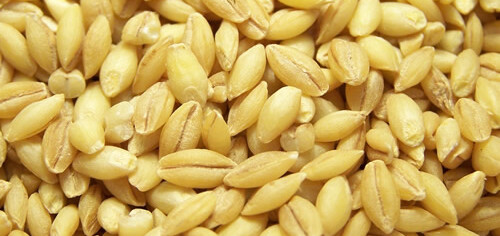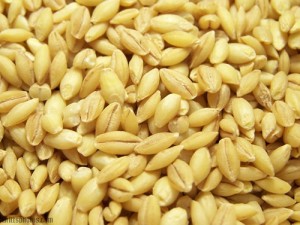We were recently asked this question. We hope that by sharing the anwer with you – we are able to help you as well.
Hi guys. Love the info! My storage spot is the garage but Summer gets hot. Am I ruining the grains I’m starting to store?
————————
Answer:
Thank you for contacting us and for your kind remarks! We’re delighted to be of service.
Ruining? Not really. But you may be shortening the life of them.
Grain stays intact and fully nutritious at approx 80degrees at the hottest. Over that temp it begins to decompose/breakdown.
If the wheat germ oil inside gets consistently hot then cool then hot then cool it will make the wheat bitter tasting and thus, not so good when you go to use it. It may also not ‘act’ like regular flour either due to the density of the oil after prolonged heat.
Indoors. In dark or no exterior windows. Dry. Away from any heat source. No hotter than 80 degrees F. Is the optimum way to store grain to last for hundreds of years.
Hopefully this helps answer your question!
—
Joseph & Donna Miller, Owners
Millers Grain House
Thank you for allowing us to serve you. It is our pleasure!
Deut 28:5 – “A blessing upon your grain-basket and kneading-bowl.”
Feel free to contact our office via email or call during business hours.
Mon – Thurs 9:00-5:00, Fri 9:00-4:00 Eastern Time (Closed Sat & Sun)
 1.828.536.4988
1.828.536.4988
Come Visit the NEW Millers Grain House – https://www.millersgrainhouse.
Free Video Encouragement – http://www.youtube.com/
Free Radio Show – Encouragement in the Kitchen – http://www.blogtalkradio.com/






Can i obtain your grain from canada
Unfortunately no. We cannot sell food products into Canada.
I found a farmer friend that would sell me 5 gal buckets of wheat at avoided cost straight from his combine. This made spending money on a wonder Jr mill and all the time & energy necessary to make 100% whole wheat bread reasonable. Your book and other guidance has been essential (Thanks) to devekoping this very enjoyable hobby. It also makes it easy to share what I have with anyone that showes an interest. The wheat I got the first year was quite clean, with contaminants consisting of stems, leafs, wheat berries still containg the outer sheath. The last year was a very damp year and they did have a bit of a problem with fungus. They knew they had the problem but it wasn’t pervasive enough to dock what they got for their wheat. The infromation I got from the internet was that it has Black Point and Scab (Fusarium head blight). I have sent questions to a number of Extension Q&A sites and get the normal warnings but the real question I had was “if I store this wheat in sealed 5gal buckets, using dry ice to fumigate it for insects and remove oxygen, will the Fungus continue to grow?”
I normally pick through the wheat berries before I grind it. I try to grab stems, leafs, and any fungus showing berries. The rejected portion is usually less than a table spoon of rejects for a cup of wheat berries inspected. The detail that makes it easy for me to continue to making bread is that almost half of what I makes goes to the farmer friends and they always rave about it. (Even the loaves that were a part of the learing curve.)
I would appreciate your thoughts on the potential impact if long term storage of this fungus contaminated wheat?
Jay Morgan
PS: Getting the wheat straight from the combine seems to yield very low (NONE) insect (weavel) contamination. If you think about it the weavels need a year round supply of starch which is not available in the field and if the combine is reasonably cleaned between uses it will not provide such a year round supply. As I sift through my wheat the only insect contamination I see is occasionally pieces of a grasshopper or blue bottle or normal house fly. They don’t live on wheat. They were there when the combine went by and got killed when they went through the combine.
Good day Jay.
To be honest the most I could say about it is if there is fungus at all, it may spread even in a depleted oxygen environment. The fact that the fungus contains more moisture than wheat that is not contaminated is the culprit, not how it is stored. Any moisture molecules will potentially expand and increase both the spread of the fungus (which often thrive in low oxygenated areas – think root rot), but also become a breeding ground for other bacterial growth due to the moisture itself. I for one would not bank on stored wheat that showed sign of blight or fungus. Too risky. But if it’s just a bucket or two out of several that are not affected by the blight/fungus – then you’re not relying on it and I’d say see what happens with those two buckets – but use the others primarily.
About infestation of weavels. Usually they stay away from the wheat if the husk is still intact. It’s once the hull is compromised (milled or has burst due to environmental factors) the weavels get right to it!
I hope this has been helpful.
Thank you for your comments on fungus and moisture. It will be kept in mind. The wheat in question was harvested last 4th of July. I do not have a good way to quantify how much I am culling from the wheat being ground. I am sure it went up as my knowledge of what I am dealing with increased. I am grinding out of the second 5 gal bucket and don’t think the concentration has changed plus talking to the farmer he feels that the damper / wetter areas of the field had more fungus attack. And, the literature from the Nebraska extension literature implied that it might be stable until and unless used as seed the following year and would increase the damage in the subsequent plantings. The bag containing the seed the farmer used indicated that he used seed that was treated with a fungicide? I don’t think I will be throwing it out but I will be watching it.
This year my farmer lost his entire winter wheat crop due to the thermal cycles in the peak of the winter. I will be playing with last years wheat and a few buckets of soy beans and corn until next years wheat comes in. I hope next year will be better.
Thanks,
I store my grain in 5 gal buckets that I get from the bakery shop in the local chain grocery store. Most of them were originally used for bulk cake icing so they need to receive multiple washings with hot water and soap. The bucket full of grain is secured with dry ice on the bottom. This does require burping the lid during CO2 generation of the dry ice to allow it to replace the oxygen. I also use this step to test the lids. Any lid that don’t hold tight enough to require burping is marked and replaced.
I have been eyeing the gamma lids and finally found them in the local hardware store and picked up a couple. These provide significant ease when on the bucket currently being worked from, vs opening the tabbed lids. To keep peace in the family I gave one of the gamma lids to my wife to store bird seed in. To our disappointment the lids are not water tight. She lost most of a 5 gal bucket of bird seed. Are they suppose to seal as good as the lids that came with the buckets?
Hi Jay.
First the original lid is no longer a good option due to the fact that the seal is less than 1/2 inch inside the lid. It can and will pop open quite easily. It was the more secure lid when it was previously sealed at the manufacturer/packing plant and the tamper-proof plastic strip was heated into the mold. But not once opened. It is not even used for more than a week at a bakery once opened.
Gamma Seal Lids are not 100% water proof because they rely on the inner lid to be secure AS WELL AS the outer rim to have been pounded securely down and/or not to have damaged the existing bucket’s rim (which both are hard to tell).
We do not use gamma seals nor bakery buckets (too flimsy and rodents can still chew through). We use these – BPA-FREE, EASY-OPEN, SPIN-LID BUCKETS
Hope this helps!